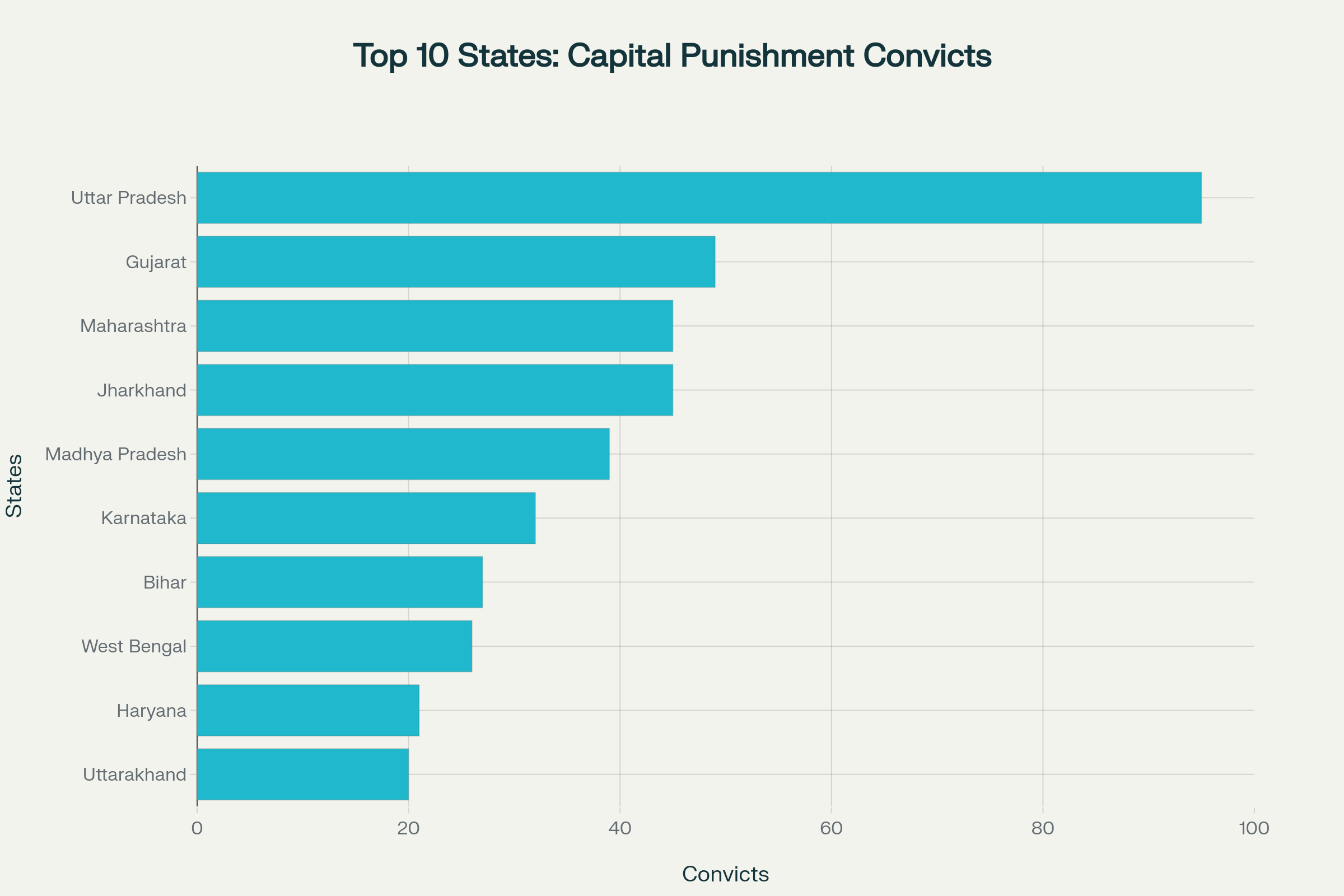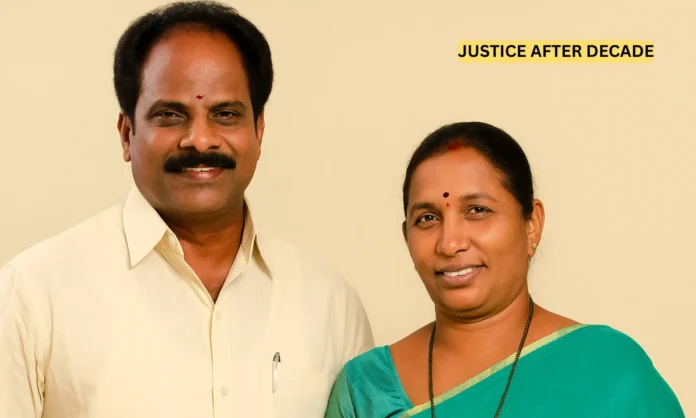Key Highlights
- Five men sentenced to death by Chittoor court for murdering former mayor Katari Anuradha and her husband Katari Mohan in November 2015
- Prime accused Sriram Chandrasekhar, the victim’s nephew, orchestrated the attack due to family and political disputes
- The brutal murder occurred inside the Chittoor Municipal Corporation office in broad daylight, shocking Andhra Pradesh
Opening Overview
A Chittoor court in Andhra Pradesh delivered justice after nearly a decade by awarding the death penalty for 5 for murdering Chittoor mayor Katari Anuradha and her husband in a sensational case that sent shockwaves across the state. The XI Additional District and Sessions Judge N Srinivasa Rao pronounced the verdict on October 31, 2025, marking the end of a long legal battle that began with the gruesome double murder on November 17, 2015.
Chittoor VI Addl. District Sessions Court has sentenced five accused to death in the 2015 murder of the former mayor couple Katari Mohan & Katari Anuradha inside the Chittoor Municipal Office. Anuradha a #TDP order was the first woman mayor of Chittoor town and the verdict ends a… pic.twitter.com/ITlRLhldYn
— Ashish (@KP_Aashish) October 31, 2025
This landmark verdict highlights the judiciary’s commitment to delivering justice in cases where public officials become victims of violent crimes, particularly when the perpetrators include family members who exploit personal relationships for criminal purposes. The death penalty for 5 for murdering Chittoor mayor represents one of the most significant judicial decisions in Andhra Pradesh’s recent criminal justice history.
The Brutal Crime That Shocked Andhra Pradesh
- The attack was meticulously planned and executed by armed assailants who entered the municipal office disguised in burqas
- Katari Anuradha was shot dead in her chamber while her husband Mohan was chased and stabbed nearby
- The murder was orchestrated by Mohan’s own nephew due to political and personal grievances
The death penalty for 5 for murdering Chittoor mayor Katari Anuradha stems from one of the most shocking crimes in Andhra Pradesh’s political history. On November 17, 2015, at approximately 11:05 AM, a group of armed men entered the Chittoor Municipal Corporation office with a calculated plan to eliminate both the mayor and her husband. The assailants, led by Sriram Chandrasekhar alias Chintu, wore burqas to conceal their identities and carried firearms along with traditional weapons like knives and daggers.
According to the investigation, Anuradha was first shot in her mayoral chamber, and when her husband Mohan attempted to escape, he was pursued and brutally stabbed to death. The death penalty for 5 for murdering Chittoor mayor was justified by the court as this represented a “rarest of rare” case involving premeditated murder of elected officials in their workplace.
Family Betrayal and Political Motivations
- Sriram Chandrasekhar, the prime accused, was Katari Mohan’s nephew who felt politically sidelined despite supporting the couple
- The accused had helped Anuradha become Chittoor’s first woman mayor but later turned against them
- Personal financial disputes and political ambitions fueled the murderous conspiracy
The death penalty for 5 for murdering Chittoor mayor reveals a disturbing tale of family betrayal that transformed blood relations into deadly enemies. Sriram Chandrasekhar, who masterminded the entire operation, was not an outsider but Katari Mohan’s own nephew who had previously supported the political careers of both victims. According to court records, Chintu had played a crucial role in helping Anuradha become Chittoor’s first woman mayor and had even served jail time for the family’s political causes.
However, personal grievances, financial disputes, and feelings of political marginalization gradually poisoned the family relationship. The death penalty for 5 for murdering Chittoor mayor underscores how political ambitions and personal vendettas can corrupt even the closest family bonds, leading to unprecedented violence. Court testimony revealed that Chintu felt betrayed when the couple allegedly sidelined him despite his loyalty and sacrifices for their political advancement.
Legal Proceedings and Judicial Response
- Initial investigation involved 23 accused persons, with only 5 ultimately receiving death sentences
- The court examined 122 witnesses during the lengthy trial process
- Judge ruled the crime as “rarest of rare” warranting capital punishment
The death penalty for 5 for murdering Chittoor mayor emerged from a comprehensive legal process that spanned nearly a decade and involved extensive investigation and testimony. The Chittoor police initially named 23 individuals in connection with the case, reflecting the complex web of conspirators and accomplices involved in planning and executing the double murder. During the trial proceedings, the court meticulously examined evidence from 122 witnesses, ensuring that every aspect of the case was thoroughly investigated before reaching the final verdict.
Of the original 23 accused, one died during the trial period, another was acquitted, and 16 others who were charged with abetment were also acquitted due to insufficient evidence. The death penalty for 5 for murdering Chittoor mayor was specifically reserved for those directly involved in the actual killing: Sriram Chandrasekhar, Govinda Swami Srinivasaiah Venkatachalapathy, Jayaprakash Reddy, Manjunath, and Muniratnam Venkatesh. The court also ordered the prime accused to pay compensation totaling Rs 70 lakh, including Rs 50 lakh to the victim’s family and Rs 20 lakh to a key eyewitness.
Impact on Death Penalty Statistics in India
- Andhra Pradesh currently has 15 prisoners on death row as of December 2022
- India has witnessed a significant increase in death sentences, reaching 564 prisoners on death row by 2024
- The Chittoor case adds to the growing number of capital punishment cases in southern Indian statess3.amazonaws
The death penalty for 5 for murdering Chittoor mayor contributes to India’s expanding death row population, which reached 564 prisoners by the end of 2024, representing the highest number in nearly two decades. According to official data from the Ministry of Home Affairs, Andhra Pradesh had 15 prisoners on death row as of December 31, 2022, placing it among the states with moderate numbers of capital punishment convicts. The death penalty for 5 for murdering Chittoor mayor reflects the judicial system’s continued reliance on capital punishment for heinous crimes, particularly those involving public officials and premeditated violence.
Statistical analysis shows that murder cases, including those involving sexual offenses and kidnapping, account for the majority of death sentences imposed across India, with 433 out of 488 total cases falling into this category. The death penalty for 5 for murdering Chittoor mayor aligns with national trends where trial courts awarded 139 new death sentences in 2024, demonstrating the judiciary’s commitment to deterrent justice in exceptional cases.

Top 10 Indian States by Number of Capital Punishment Convicts (December 2022)
Closing Assessment
The death penalty for 5 for murdering Chittoor mayor Katari Anuradha and her husband represents a significant milestone in India’s pursuit of justice for crimes against elected officials and public servants. This verdict sends a powerful message that violence against democratic institutions and their representatives will face the severest consequences under Indian law. The case also highlights the complex dynamics of political violence in India, where personal grievances and family disputes can escalate into acts of extreme brutality that shock entire communities.
As India continues to grapple with increasing numbers of death row prisoners and debates around capital punishment, the death penalty for 5 for murdering Chittoor mayor serves as a reminder that the judiciary remains committed to protecting democratic institutions through deterrent justice. The comprehensive investigation, thorough trial proceedings, and ultimate verdict demonstrate the Indian legal system’s capacity to deliver justice even in the most complex and sensitive cases involving family betrayal and political violence.


